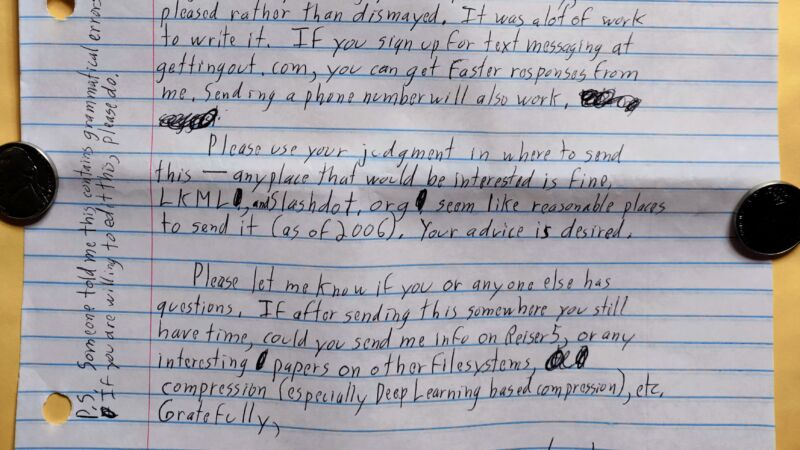
With the ReiserFS recently considered obsolete and slated for removal from the Linux kernel entirely, Fredrick R. Brennan, font designer and (now regretful) founder of 8chan, wrote to the filesystem’s creator, Hans Reiser, asking if he wanted to reply to the discussion on the Linux Kernel Mailing List (LKML).
Reiser, 59, serving a potential life sentence in a California prison for the 2006 murder of his estranged wife, Nina Reiser, wrote back with more than 6,500 words, which Brennan then forwarded to the LKML. It’s not often you see somebody apologize for killing their wife, explain their coding decisions around balanced trees versus extensible hashing, and suggest that elementary schools offer the same kinds of emotional intelligence curriculum that they’ve worked through in prison, in a software mailing list. It’s quite a document.
What follows is a relative summary of Reiser’s letter, dated November 26, 2023, which we first saw on the Phoronix blog, and which, by all appearances, is authentic (or would otherwise be an epic bit of minutely detailed fraud for no particular reason). It covers, broadly, why Reiser believes his system failed to gain mindshare among Linux users, beyond the most obvious reason. This leads Reiser to detail the technical possibilities, his interpersonal and leadership failings and development, some lingering regrets about dealings with SUSE and Oracle and the Linux community at large, and other topics, including modern Russian geopolitics.
“LKML and Slashdot.org seem like reasonable places to send it (as of 2006)”
In a cover letter, Reiser tells Brennan that he hopes he can use OCR to import his lengthy letter and asks him to use his best judgment in where to send his reply. He also asks, if he has time, Brennan might send him information on “Reiser5, or any interesting papers on other Filesystems, compression (especially Deep Learning based compression), etc.”
Then Reiser addresses the kernel mailing list directly—very directly:
I was asked by a kind Fredrick Brennan for my comments that I might offer on the discussion of removing ReiserFS V3 from the kernel. I don’t post directly because I am in prison for killing my wife Nina in 2006.
I am very sorry for my crime–a proper apology would be off topic for this forum, but available to any who ask.
A detailed apology for how I interacted with the Linux kernel community, and some history of V3 and V4, are included, along with descriptions of what the technical issues were. I have been attending prison workshops, and working hard on improving my social skills to aid my becoming less of a danger to society. The man I am now would do things very differently from how I did things then.
ReiserFS V3 was “our first filesystem, and in doing it we made mistakes, because we didn’t know what we were doing,” Reiser writes. He worked through “years of dark depression” to get V3 up to the performance speeds of ext2, but regrets how he celebrated that milestone. “The man I was then presented papers with benchmarks showing that ReiserFS was faster than ext2. The man I am now would stat his papers … crediting them for being faster than the filesystems of other operating systems, and thanking them for the years we used their filesystem to write ours.” It was “my first serious social mistake in the Linux community, and it was completely unnecessary.”
Reiser asks that a number of people who worked on ReiserFS be included in “one last release” of the README, and to “delete anything in there I might have said about why they were not credited.” He says prison has changed him in conflict resolution and with his “tendency to see people in extremes.”
Reiser extensively praises Mikhail Gilula, the “brightest mind in his generation of computer scientists,” for his work on ReiserFS from Russia and for his ideas on rewriting everything the field knew about data structures. With their ideas on filesystems and namespaces combined, it would be “the most important refactoring of code ever.” His analogy at the time, Reiser wrote, was Adam Smith’s ideas of how roads, waterways, and free trade affected civilization development; ReiserFS’ ideas could similarly change “the expressive power of the operating system.”
